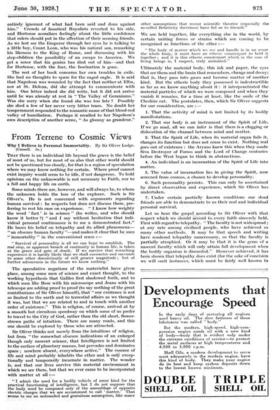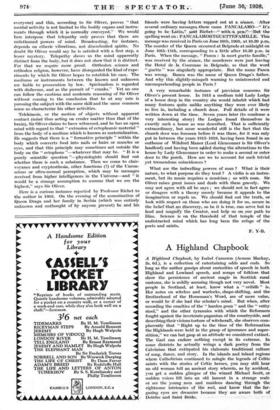From Terrene to Cosmic Views
Why I Believe in Personal Immortality. By Sir Oliver Lodge.
(Cassell. 5s.) •
THAT there is an individual life beyond the grave is the belief
of most of us, but for most of us also that other world should not be questioned too closely, for that is a region of speculation where we may know nothing for certain. Where proof cannot exist inquiry would seem to be idle, if not dangerous. To hold opinions on the unknowable is not necessary to Faith, nor to a full and happy life on earth.
Some minds there are, however, and will always be, to whom the unknown holds the lure of the explorer. Such is Sir Oliver's. He is not concerned with arguments regarding human survival : he respects but does not discuss them, pre- ferring to rest his case on experience. " I know how weighty the word ' fact ' is in science" (he writes, • and who should know it better ?) " and I say without hesitation that indi- vidual personal continuance is to me a deinonstrated fact." He bases his belief on telepathy and its allied phenomena- " an obscure human faculty "—and makes it clear that he uses " immortality " in the conventional sense :—
" Survival of personality is all we can hope to establish. The real step, or apparent-breach of continuity in human life, is taken at the grave and gate of death. If we survive that wrenching experience it is hardly likely that we shall encounter and succumb to some other discontinuity of still greater magnitude ; but of further adventures in the future we know nothing."
The speculative negations of the materialist have given place, among some men of science and exact thought, to the working hypothesis that Galileo first shadowed forth, and to Which men like Bose with his microscope and Jeans with his telescope are adding proof to proof (to say nothing of the great contributions of Sir Oliver himself), that " our existence is not so limited to the earth and to terrestial affairs as we thought it was, but that we are related to and in touch with another
order of existence." This is religion, of course, arrived at by a smooth but circuitous speedway on which some of us prefer to travel to the City of God, rather than the old short, flower- strewn paths of intuition. There are many roads, and this one should be explored by those who are attracted.
Sir Oliver thinks not merely from the intuitions of religion, but from "the somewhat obscure indications of an enlarged though only nascent science, that Intelligence is not limited to the surface of planetary masses, but pervades and dominates space ; nowhere absent, everywhere active." The essence of life and mind probably inhabits the ether and is only excep-
tionally and temporarily incarnate in matter. The wonder is, not that our lives survive this material environment in which we see them, but that we ever came to be incorporated with matter at all :-
" I admit the need for a bodily vehicle of some kind for the practical functioning of intelligence, but I do not suppose that the body need be composed only of -the assemblage of opposite electric charges that we are accustomed to call matter.' That seems to me an unfounded and gratuitous assumption, like many
other assumptions that recent scientific theories (especially the so-called Relativity doctrines) have led us to discard."
•
We are held together, like everything else in the world, by certain uniting forces or strains which are coming to be recognized as functions of the ether :—
" The body of matter which we see and handle is in no sense the whole body, it must have an etheric counterpart to hold it together ; and it is this etheric counterpart which in the case of living beings is, I suspect, truly animated."
Ultimately the material body, this ink and paper, the eyes that see them and the brain that remembers, change and decay; that is, they pass into gases and become matter of another kind. But the etheric body they possessed is indestructible as far as we know anything about it : it interpenetrated the material particles of which we were composed and when they vanish it remains, for a time at least, like the smile of the Cheshire cat. The postulates, then, which Sir Oliver suggests for our consideration, are :— I. That the activity of mind is not limited by its bodily manifestations.
2. That our body is an instrument of the Spirit of Life. If we go mad, all we can infer is that there is a clogging or
dislocation of the channel between mind and matter.
3. That the Spirit of Life, when its material organ fails it, changes its function but does not cease to exist. Nothing real goes out of existence : the Aryans knew this when they made Siva Destroyer of Forms and the Lord of Change centuries before the West began to think in abstractions.
4. An individual is an incarnation of the Spirit of Life into matter.
5. The value of incarnation lies in giving the Spirit, now screened from cosmos, a chance to develop personality.
6. Such personality persists. This can only be ascertained by direct observation and experience, which Sir Oliver has undertaken.
7. Under certain partially known conditions our dead friends are able to demonstrate to us their real and individual personal survival.
Let us hear the gospel according to Sir Oliver with that
respect which we should-4&aid to every faith sincerely held. First with regard to telepathy. " The faculty is not widespread ; at any rate among civilized people, who have achieved so many other methods. It may be that speech and writing haVe rendered telepathy unnecessary, so that the faculty is partially atrophied. Or it may be that it is the germ of a nascent faculty which will only attain full development when the bodily organism is discarded." However achieved, it has been shown that telepathy does exist (for the sake of concision we will omit instances; which must be fairly well known to everyone) and this, according to Sir Oliver, proves " that mental activity is not limited to the bodily organs and instru- ments through which it its normally cenveyed."- We would here interpose that telepathy only proves that there are unfathonaed powers of mind. Broadcasting, for instance, depends on etheric vibrations, not disembodied spirits. No doubt Sir Oliver would say he is satisfied with a first step, a lesser mystery. Telepathy shows us the mind apparently distinct from the body, but it does not show that it is distinct. For that we require more proof. . .Orthodox -science and orthodox religion, however, have disregarded the kind of expe- riments by which Sir Oliver hopes to establish his case. The mediums or instruments between the known and unknown are liable to prosecution by law. Spiritualism is regarded with disfavour, and as the pursuit of " cranks." Yet no one can follow the cautious and moderate reasoning of Sir Oliver without coming to the conclusion that he at any rate is pursuing the subject with the same skill and the same common sense as characterize his other activities.
-Telekinesis, or the motion of objects without apparent contact (mind thus acting on cruder matter than that of the brain), Sir Oliver claims to have witnessed, and he has an open mind with regard to that " extrusion of ectoplasmic material from the body of a medium which is known as materialization. He suggests that there is a " formative principle " within the body which converts food into nails or hairs or muscles or eyes, and that this principle may sometimes act outside the body on the " ectoplasm "—whatever that may be. " It is a purely scientific question "—physiologists should find out whether there is such a substance. Then we come to clair- voyance and cryptesthesia, other functions (?) of the Uncon- scious or ultra-normal perception, which may be messages received from higher intelligences in the Universe—and " it would be a strange assumption to assume that we are the highest," says Sir Oliver.
Here is a curious instance reported by Professor Richet to the author in 1903. On the evening of the assassination of Queen Drage and her family in Serbia (which was entirely unknown and unthought of by anyone present) hg and his
friends- were having • letters -rapped out at a seance. -After several ordinary messagesithere came PANCALAMO—" It's going to be. Latina'-' paid Richet--" with.4 pew" ,But the spelling went on : PANCALAMORTGUETTEFAMILLE. This message was received in Paris on June 10th, 1903, at 10.30 p.m. The murder of the Queen occurred at Belgrade at midnight on June 10th-11th, corresponding to a little after 10.30 p.m. in Paris. When the message, " Panes : la wort guette famine," was received by the seance, the murderers were just leaving the Hotel de la -Couronne in Belgrade, so that the word, " guette " was singularly appropriate. But the name Pence was wrong. Banca was the name of Queen Draga's father. And why this slightly-misspelt warning to uninterested and uncomprehending people in Paris ?
A very remarkable instance of prevision concerns Sir Oliver's present house. In 1913 a medium told Lady Lodge of a house deep in the country she would inhabit which had many features quite unlike anything they were ever likely to live in, including a church door. Full details of it were written down at the time. Seven years. later (to condense a very interesting story) the Lodges found themselves in exactly such a house as was described. That is sufficiently extraordinary, but more wonderful still is the fact that the church door was- foreseen before it was there, for it was only put in between- the years 1915-1919, having been found in an outhouse of Wilsford Manor (Lord Glenconner is Sir Oliver's landlord) and having been added during the alterations to the house by Lady Glenconner in order to make a second or outer, door to the porch. How are we to account for such trivial yet tremendous coincidences 9 What are the indwelling powers of man ? What is their nature, to what purpose do they tend ? A violin is an instru- ment, but its music requires a musician ; so with man. Sir Oliver raises great issues and deals with them gravely. We may not agree with all he says ; we should not in fact agree or disagree with a theory merely because it appeals to the imagination or repels us. We should find out the truth, or look with respect on those who are doing it for us, secure in the belief_ that no discovery, so be it is true, can serve but to laud and magnify the Creator, and help us on• our path to' Him. Science is on the threshold of that temple of the. undistracted mind which has long been the refuge of the poets and saints.
F. Y-B.









































 Previous page
Previous page